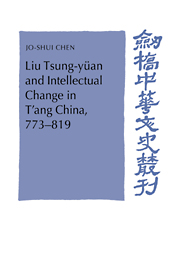Book contents
- Frontmatter
- Contents
- Acknowledgments
- Maps
- Chronology
- Abbreviations
- Introduction
- 1 Literati and thought in the early and middle T'ang
- 2 Liu Tsung-yüan and the circumstances of Ch'ang-an
- 3 805: The abortive reform
- 4 Declaration of principles: Tao and antiquity
- 5 Heaven, the supernatural, and Tao
- 6 Literary theory, canonical studies, and beyond
- 7 Sources of Liu's Confucian thought
- 8 The private sphere
- Conclusion
- Glossary
- Bibliography
- Index
7 - Sources of Liu's Confucian thought
Published online by Cambridge University Press: 07 October 2009
- Frontmatter
- Contents
- Acknowledgments
- Maps
- Chronology
- Abbreviations
- Introduction
- 1 Literati and thought in the early and middle T'ang
- 2 Liu Tsung-yüan and the circumstances of Ch'ang-an
- 3 805: The abortive reform
- 4 Declaration of principles: Tao and antiquity
- 5 Heaven, the supernatural, and Tao
- 6 Literary theory, canonical studies, and beyond
- 7 Sources of Liu's Confucian thought
- 8 The private sphere
- Conclusion
- Glossary
- Bibliography
- Index
Summary
In my presentation of Liu Tsung-yüan's Confucian thought thus far, I have tried not only to describe his ideas but also to explain why he held those views. The sources of his vision of and devotion to Confucianism should largely have become clear. There is no question that the ongoing mid-T'ang Confucian revival, especially in the forms of the ku-wen movement and new canonical studies, exerted a vital influence on Liu's intellectual endeavor. In his transformation from a man of action to a man of ideas in Yung-chou, this revival provided him with both a sense of direction and a forum for discourse. Moreover, Liu's early political activism and reformism definitely accounted for his characterization of the Confucian Tao. His family background, that of an average aristocratic family from the Kuan-Lung group, seems also to have some bearings on his thought and action. Now I would like to introduce two additional factors that apparently contributed to the formation of Liu's conception of Confucianism, in the hope that they may shed further light on the origins of his Confucian mentality. These two factors are his idea of “the people” and the probable influence of the Ch'an Buddhist movement, which came into being earlier than the Confucian revival.
The rise of the people
When one reads Liu Tsung-yüan's works, one cannot help but notice a word that penetrates the entirety of his discussion of the Confucian doctrine. This word is “jen”, the people, or simply man.
- Type
- Chapter
- Information
- Liu Tsung-yüan and Intellectual Change in T'ang China, 773–819 , pp. 149 - 162Publisher: Cambridge University PressPrint publication year: 1992

